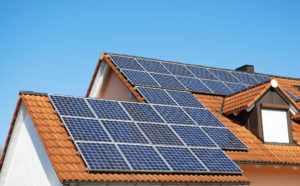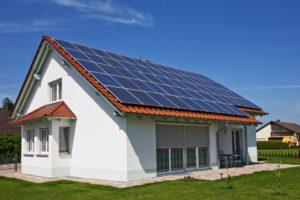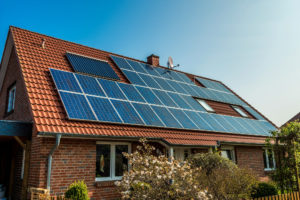Solar power offers two primary options: on-grid and off-grid systems. In this article, we will dive into the details of each system, including their functionality, advantages, and considerations, helping you determine the best fit for your solar energy needs.
Contents
- 1 Key Takeaways
- 2 On-Grid Solar Systems: Harnessing Solar Power within the Grid
- 3 Off-Grid Solar Systems: Independence from the Power Grid
- 4 Hybrid Solar Systems: The Best of Both Worlds
- 5 Key Differences Between On-Grid and Off-Grid Solar Systems
- 6 Table of Key Differences Between On-Grid and Off-Grid Solar Systems
- 7 Choosing the Right Solar System for Your Needs
- 8 Experience Solar Excellence with Us!
- 9 Conclusion
Key Takeaways
- On-grid solar systems are connected to the power grid, providing cost savings, access to reliable grid power, and easy maintenance.
- Off-grid solar systems operate independently, offering energy independence, uninterrupted power supply, and reduced carbon footprint.
- Hybrid solar systems combine on-grid and off-grid capabilities, providing flexibility, customization, and the best of both worlds.
On-Grid Solar Systems: Harnessing Solar Power within the Grid
On-grid solar or grid-tied systems are designed to work with the utility grid. Let’s take a closer look at how these systems operate and the benefits they offer.
How On-Grid Systems Work
An on-grid solar system is connected to the power grid, allowing the generated solar energy to be utilized directly. It consists of solar panels, an inverter, and a bi-directional meter. The solar panels convert sunlight into electricity, which the inverter feeds into the grid. The bi-directional meter measures the electricity flow between the system and the grid.
Advantages of On-Grid Solar Systems
On-grid systems come with numerous advantages, including:
- Cost Savings and Return on Investment: With an on-grid system, you can offset your electricity bills by generating your power. Any excess energy produced can be fed back into the grid, resulting in credits or reduced bills.
- Access to Reliable Grid Power as Backup: On-grid systems provide seamless access to grid electricity during periods of high energy consumption or inclement weather when the solar system might not generate sufficient power.
- Easy Maintenance and Serviceability: On-grid systems are relatively simple to maintain as they do not require additional storage components like batteries. The utility grid acts as a buffer, ensuring continuous power supply.
- Contributing to a Sustainable Energy Future: Using on-grid solar systems helps reduce reliance on fossil fuels and contributes to a cleaner and greener energy future.
Considerations for Choosing an On-Grid System
Before opting for an on-grid solar system, it is essential to consider a few key factors:
- Grid Reliability and Availability: Assess the reliability and stability of the local power grid. Regions with frequent power outages may benefit from additional backup options.
- Net Metering Policies and Incentives: Familiarize yourself with your utility company’s net metering policies and incentives. These programs allow you to receive credits for excess energy fed back into the grid.
- Local Regulations and Permitting Requirements: Research local regulations, building codes, and permitting requirements for grid-tied systems to ensure compliance and a smooth installation process.

Off-Grid Solar Systems: Independence from the Power Grid
Off-grid solar systems are designed to operate independently without connecting to the utility grid. Let’s explore how these systems work and the advantages they offer.
How Off-Grid Systems Work
An off-grid solar system operates as a standalone power generation and storage system. It includes solar panels, a charge controller, batteries for energy storage, and an inverter to convert stored energy into usable AC power. The solar panels generate electricity during the day, which is stored in the batteries for use during periods of low sunlight or at night.
Advantages of Off-Grid Solar Systems
Off-grid systems offer several advantages, making them a suitable option for specific situations:
- Energy Independence and Self-Sufficiency: Off-grid systems provide complete autonomy and self-reliance. They are ideal for remote locations where the grid connection is either unavailable or prohibitively expensive.
- Remote Power Generation in Rural Areas: Off-grid solar systems are an excellent solution for rural areas that lack access to reliable grid power. They enable residents to harness solar energy and enjoy electricity without a utility grid.
- Uninterrupted Power Supply in Case of Grid Outages: During power outages or natural disasters, off-grid systems ensure a continuous power supply, allowing you to maintain essential appliances and services.
- Environmental Benefits and Reduced Carbon Footprint: By relying on renewable solar energy, off-grid systems reduce reliance on fossil fuels, minimize greenhouse gas emissions, and contribute to a cleaner environment.
Considerations for Choosing an Off-Grid System
Before deciding on an off-grid solar system, there are several important considerations to keep in mind:
- Location and Availability of Sunlight: Assess the solar resources available in your location. Sufficient sunlight is necessary to generate the required energy for off-grid systems.
- Energy Consumption and Load Requirements: Calculate your energy consumption and assess the load requirements to determine the solar panel array size, battery capacity, and overall system sizing.
- Battery Capacity and Storage System Sizing: Properly sizing the battery storage system is crucial to ensure a reliable and uninterrupted power supply. Consider energy usage patterns, expected autonomy, and backup requirements.

Hybrid Solar Systems: The Best of Both Worlds
Hybrid solar systems combine the features of both on-grid and off-grid systems, offering flexibility and customization. Let’s explore the benefits and functionality of hybrid solar systems.
- Introduction to Hybrid Solar Systems: Hybrid systems incorporate elements of both on-grid and off-grid systems, allowing for grid connection and energy storage capabilities.
- Combining On-Grid and Off-Grid Capabilities: Hybrid systems enable homeowners to utilize solar power for daily electricity consumption while storing excess energy during grid outages.
- Flexibility in Power Generation and Storage: Hybrid systems allow switching between grid-connected and off-grid modes, offering control over energy consumption and storage.
- Customizable Solutions for Different Energy Needs: Hybrid systems can be tailored to match individual energy requirements, making them suitable for a wide range of residential and commercial applications.
Key Differences Between On-Grid and Off-Grid Solar Systems
Understanding the distinctions between on-grid and off-grid solar systems is essential for making informed decisions. Let’s explore the key differences between the two:
Connection to the Power Grid
- On-Grid: On-grid systems are connected to the power grid and rely on it for supplemental power supply when needed.
- Off-Grid: Off-grid systems operate independently and are not connected to the power grid, making them self-sufficient in power generation and storage.
Power Generation and Storage
- On-Grid: On-grid systems immediately utilize solar power as it is generated without extensive storage.
- Off-Grid: Off-grid systems require battery storage to store excess energy generated during the day for use during periods of low sunlight or at night.
Energy Independence and Grid Reliability
- On-Grid: On-grid systems offer access to grid power as a backup during high energy consumption or grid outages.
- Off-Grid: Off-grid systems provide energy independence and an uninterrupted power supply, even without a reliable grid connection.

Table of Key Differences Between On-Grid and Off-Grid Solar Systems
Understanding the key differences between on-grid and off-grid solar systems is essential when considering solar energy options. The table below highlights the contrasting characteristics of these systems, allowing you to make an informed decision based on your specific needs and circumstances.
| KEY DIFFERENCES | ON-GRID SOLAR SYSTEMS | OFF-GRID SOLAR SYSTEMS |
|---|---|---|
| Connection to the Power Grid | Connected to the power grid | Not connected to the power grid |
| Power Generation and Storage | Immediate utilization of solar power without extensive storage | Require battery storage for storing excess energy |
| Energy Independence and Grid Reliability | Access to grid power as a backup | Energy independence and uninterrupted power supply |
| Cost Considerations | Lower upfront costs | Higher upfront costs due to the need for battery storage |
| Reliance on Grid | Relies on the grid for supplemental power | Self-sufficient in power generation and storage |
| Suitable for | Urban areas with reliable grid connection | Remote areas without access to the power grid |
| Environmental Impact | Reduces reliance on traditional energy sources | Minimal carbon footprint and environmental impact |
| Flexibility | Limited flexibility due to grid connection | Provides flexibility in power generation and storage |
Choosing the Right Solar System for Your Needs
To determine the most suitable solar system for your needs, consider the following factors:
Assessing Your Energy Requirements
Evaluate your energy consumption and load profile to determine the solar panel array size and the storage capacity needed. This assessment ensures that your system meets your daily energy needs efficiently.
Considering Your Location and Environment
Assess the availability of sunlight in your location and the impact of local climate conditions on solar power generation. Understanding these factors helps optimize system performance and energy output.
Evaluating Financial Considerations
Consider the upfront costs and potential savings associated with on-grid and off-grid solar systems. Assess the return on investment, payback period, and available incentives to make an informed financial decision.
Experience Solar Excellence with Us!
Trust in Solar Panels Network USA, where our seasoned experts deliver top-quality solar solutions for homes and businesses nationwide. With a legacy of countless successful installations and a commitment to sustainable energy, we’re your reliable partner in the solar journey. Ready for a brighter, eco-friendly future? Call us now at (855) 427-0058 and harness the power of the sun!
Conclusion
Understanding the distinctions between on-grid, off-grid, and hybrid solar systems is essential for choosing the right solution to meet your energy needs. On-grid systems offer cost savings and grid reliability, while off-grid systems provide independence and uninterrupted power supply. Consider your specific requirements, location, and financial considerations to make an informed decision. Embrace solar power for a sustainable and resilient energy future.
About the Author
Solar Panels Network USA stands at the forefront of solar energy solutions, driven by a team of seasoned solar engineers and energy consultants. With over decades of experience in delivering high-quality solar installations and maintenance, we are committed to promoting sustainable energy through customer-centric, tailored solutions. Our articles reflect this commitment, crafted collaboratively by experts to provide accurate, up-to-date insights into solar technology, ensuring our readers are well-informed and empowered in their solar energy decisions.

